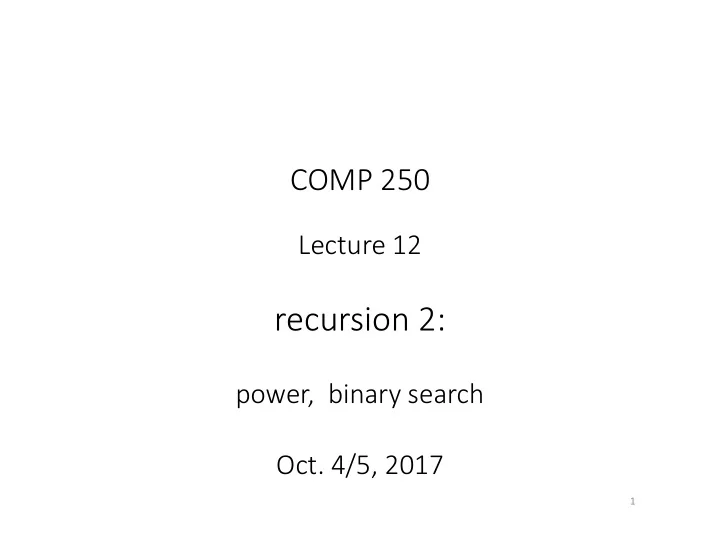

COMP 250 Lecture 12 recursion 2: power, binary search Oct. 4/5, 2017 1
Recall: Converting to binary (iterative) k = 0 while n > 0 { b[ k ] = n % 2 n = n / 2 k++ } Recall that in binary needs approximately bits. 2
Converting to binary (recursive) toBinary( n ){ if n > 0 { print n % 2 toBinary( n / 2 ) } } // prints b[ k ], k = 0, 1, ….. 3
Power ( ) Let a positive integer and let be a positive number. has some number of bits e.g. 32. power(x, n){ // iterative result = 1 for i = 1 to n result = result * x return result } 4
How to compute power() using recursion ? Example = ∗ 5
How to compute power() using recursion ? More interesting approach: = ∗ = ∗ ∗ = ∗ 6
power( x, n ){ // recursive if n == 0 return 1 else if n == 1 return x else{ tmp = power( x, n/2 ) // n/2 is integer division if n is even return tmp*tmp // one multiplication else return tmp*tmp*x // two multiplications } } 7
Example: = (243) = (11110011) Number of multiplies is 5*2 + 2*1 = 12. Why? The highest order bit is the base case, and doesn’t require a multiplication. 8
ASIDE The recursive method uses fewer multiplications than the iterative method, and thus the recursive method seems faster. Q: Is this recursive method indeed faster? A: No. Why not ? 9
Hint: Let be a positive integer with M digits. has about ? digits. has about ? digits. : has about ? digits. 10
Hint: Let be a positive integer with M digits. has about 2M digits. has about 3M digits. : ∗ M digits. has about We cannot assume that multiplication takes ‘constant’ time. Taking large powers gives very large numbers. In Java, use the BigInteger class. (See Exercises for more details.) 11
Binary Search -75 -31 Input: -26 -4 • a sorted list of size n 1 • the value that we are searching for 6 25 Output: 26 28 39 If the value is in the list, return its index . 72 Otherwise, return -1 . 141 290 300 12
Binary Search -75 -31 Example: Search for 17. -26 -4 1 What is an efficient way to do this ? 6 25 26 28 39 72 141 290 300 13
Think of how you search for a term in an index. Do you start at the beginning and then scan through to the end? (No.) 14
Examine the item at the middle position of the list. -75 low = 0 -31 -26 -4 1 6 compare 17 to 25 mid = (low + high) / 2 26 28 39 72 141 290 300 high = size - 1 15
-75 low = 0 -31 -26 search for 17 here -4 1 6 25 mid = (low + high) / 2 26 28 39 72 141 290 300 high = size - 1 16
-75 low = 0 -31 compare 17 to -26 mid = (low + high) / 2 -4 1 6 high 25 26 28 39 72 141 290 300 17
-75 -31 -26 -4 low = 0 search for 17 here 1 mid = (low + high) / 2 6 high 25 26 28 39 72 141 290 300 18
-75 -31 -26 -4 low = 0 compare 17 to 1 mid = (low + high) / 2 6 high 25 26 28 39 72 141 290 300 19
-75 -31 -26 -4 1 6 low = high search for 17 here 25 26 28 39 72 141 290 300 20
-75 -31 -26 -4 1 compare 17 to 6 low = high 25 26 so return index -1 28 (value 17 not found) 39 72 141 290 300 21
binarySearch( list, value){ low = 0 high = list.size - 1 while low <= high { …. } return -1 // value not in list } 22
binarySearch(list, value ){ low = 0 high = list.size - 1 while low <= high { mid = (low + high)/ 2 // if high == low + 1, then mid == low if list[mid] == value return mid else{ // modify low or high } } return -1 // value not in list } 23
binarySearch(list, value ){ low = 0 high = list.size - 1 while low <= high { mid = (low + high)/ 2 // if high == low + 1, then mid == low if list[mid] == value return mid else{ if value < list[mid] high = mid - 1 // high can become less than low. else low = mid + 1 } } return -1 // value not found } 24
binarySearch(list, value ){ how to make this recursive ? } 25
binarySearch( list, value, low, high ){ // pass as parameters if low <= high { // if instead of while mid = (low + high)/ 2 if value == list[mid] return mid else if value < list[mid] return binarySearch(list, value, low, mid - 1 ) // mid-1 can be less than low else return binarySearch(list, value, mid+1, high) } else return -1 } 26
Observations about binary search Q: How many times through the while loop ? (iterative) How many recursive calls? (recursive) A: 27
Observations about binary search Q: How many times through the while loop ? (iterative) How many recursive calls? (recursive) A: Time to search is worst case O( ) where is size of the list. Why? Because each time we are approximately halving the size of the list. 28
Three “ O( )” problems • Converting a number to binary • Power( x, n ) -- how many multiplies ? • Binary search in a sorted array The binary property is related to the base 2 of the log. 29
Recommend
More recommend